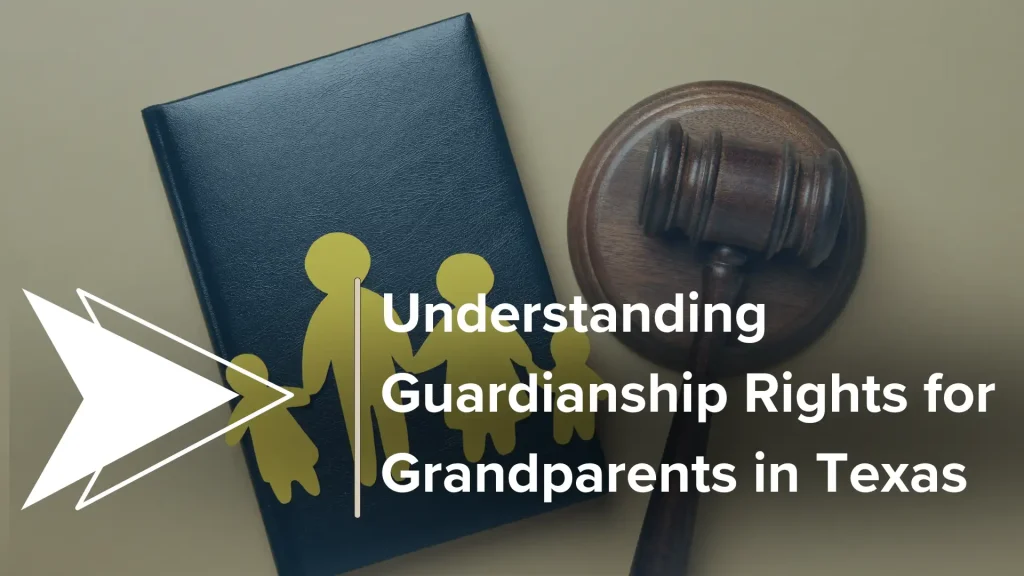 Grandparents often become the steady support system children need when a crisis hits. In Texas, grandparents may step in legally when a parent is unable or unwilling to care for their child. But guardianship isn’t a simple handoff. It’s a legal process that requires proof, patience, and a clear understanding of what’s involved, especially when navigating grandparents’ guardianship rights and the unique challenges they can bring.
Grandparents often become the steady support system children need when a crisis hits. In Texas, grandparents may step in legally when a parent is unable or unwilling to care for their child. But guardianship isn’t a simple handoff. It’s a legal process that requires proof, patience, and a clear understanding of what’s involved, especially when navigating grandparents’ guardianship rights and the unique challenges they can bring.
This guide explains when guardianship makes sense, what rights and responsibilities it entails, and how Texas law treats grandparents in these situations.
What Is Guardianship and How Does It Apply to Grandparents?
Guardianship is a legal arrangement approved by the court that lets someone decide for a child when the parents can’t. It gives formal authority over things like healthcare, schooling, and living arrangements, far more than what informal caregiving allows.
For grandparents, this often comes up when a child has been in their care for a while or the parents are struggling with issues like incarceration, substance abuse, or abandonment. Without legal guardianship, grandparents may have problems appointing a legal guardian, enrolling the child in school, getting medical care, or applying for benefits.
In Texas, guardianship usually goes through probate court and may be temporary or long-term. It differs from grandparents’ custody, which is handled in family court. While it doesn’t terminate parental rights, it gives the guardian legal responsibility for day-to-day care—something essential to understand regarding grandparents and grandchildren: your rights explained clearly can make all the difference.
When Can Grandparents Seek Guardianship?
Texas law allows grandparents to request guardianship when it’s in the best interest of the child and the parents are either unable or unwilling to provide proper care. This might happen when:
- A parent is incarcerated or hospitalized
- The child has been living with the grandparent without formal custody of the child
- A parent struggles with addiction or mental illness
- There’s evidence of abuse, neglect, or abandonment
The court doesn’t grant guardianship lightly. Grandparents must present evidence showing why the child would be better off in their care. Judges typically look at the stability of the home, the emotional bond between the child and grandparent, and whether the child has already been living in the house. Any past caregiving role can strengthen the case.
There are different types of guardianship, depending on the situation:
- Temporary Guardianship: This is granted when there’s an urgent need for someone to make decisions for the child, such as during a medical emergency or while a parent is undergoing treatment. It’s typically short-term and may be converted to permanent guardianship if circumstances don’t improve.
- Emergency Guardianship: In situations involving immediate danger, like unsafe living conditions, abuse, or neglect, the court can approve emergency guardianship quickly to protect the child from harm.
The court expects a clear plan and strong reasons to support the change in both scenarios.
Legal Rights and Responsibilities of Grandparent Guardians
Becoming a guardian gives grandparents legal authority, but it also comes with serious obligations. A guardian is responsible for making decisions that affect every part of a child’s life—from where they live to how they receive healthcare and education.
Some of the key responsibilities include:
- Providing a safe and stable home
- Supporting the child’s physical, emotional, and educational needs
- Making day-to-day decisions about school, medical care, and extracurricular activities
- Ensuring the child maintains healthy relationships (when appropriate) with parents or other family members
Guardianship does not automatically end a parent’s rights. In most child custody cases, parents may still have court-granted visitation unless it’s deemed harmful to the child. The goal is usually to protect the child while giving the parent time and space to address whatever issues led to the guardianship request in the first place.
Texas courts take these cases seriously. Guardianship arrangements often require follow-up hearings, progress reports, or other forms of accountability to ensure the child remains in a healthy and supportive environment. If a parent can care for the child again, guardianship can sometimes be modified or terminated through another legal process.
Please read more about child custody arrangements here: Does Religion Affect Child Custody Arrangements?
The Guardianship Process in Texas
 To become a legal guardian, grandparents must file a petition with the court and attend a hearing. The process typically includes:
To become a legal guardian, grandparents must file a petition with the court and attend a hearing. The process typically includes:
- Submitting detailed information about the child’s current situation
- Notifying the parents and giving them a chance to respond
- Providing evidence to support the claim that guardianship is necessary
- Possibly undergoing a home study or background check
If one or both parents contest the petition, the case may involve testimony, documentation, and legal representation. Even when uncontested, working with a family law attorney can help you navigate the paperwork and deadlines more effectively.
Start with Legal Support You Can Trust
If you’re considering pursuing guardianship in Texas, the team at Adams Law Firm Attorneys & Counselors, PLLC is here to help. We’ll explain your options, handle the paperwork, and guide you through what comes next. Our team is here to help you understand your rights and take the first step toward securing the necessary benefits. Call (281) 391-9237 or fill out our contact form to get started.
Related Post
How to Create a Parenting Agreement



